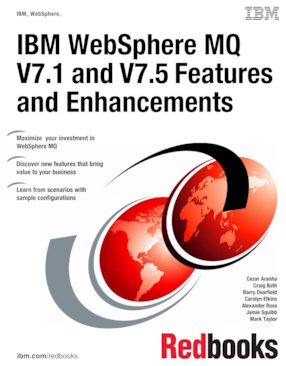IBM WebSphere MQ V7.1 and V7.5 Features and Enhancements
An IBM Redbooks publication
Note: This is publication is now archived. For reference only.

Published on 28 February 2013
ISBN-10: 0738437697
ISBN-13: 9780738437699
IBM Form #: SG24-8087-00
Authors: Cezar Aranha, Craig Both, Barry Dearfield, Carolyn (Lyn) Elkins, Alexander Ross, Jamie Squibb and Mark Taylor
This IBM® Redbooks® publication is divided into four parts:
Part 1 introduces message-oriented middleware and the WebSphere® MQ product. It explains how messaging technologies are implemented in WebSphere MQ and shows how to get started with configuring a WebSphere MQ environment. This part briefly lists the new features of WebSphere MQ V7.1 and V7.5.
Part 2 introduces the enhancements to WebSphere MQ in Version 7 Release 1. It provides a description of the new features, their business value, and usage examples. It describes enhancements to WebSphere MQ for multiplatforms and z/OS®. Examples of features that are discussed in this part include multiple installation support for multiplatforms, enhanced security with channel authentication records, enhanced clustering, improved availability and scalability on z/OS, and more.
Part 3 introduces the enhancements to WebSphere MQ in Version 7 Release 5 for multiplatforms. It provides a description of the new features, their business value, and usage examples. Examples of enhancements that are discussed in this part include new installation options, such as the bundling of WebSphere MQ Advanced Message Security and WebSphere MQ Managed File Transfer.
Part 4 contains practical scenarios that demonstrate how the new features and enhancements work and how to use them.
In summary, the introduction gives a broad understanding of messaging technologies and WebSphere MQ. It helps you understand the business value of WebSphere MQ. It provides introductory information to help you get started with WebSphere MQ. No previous knowledge of the product and messaging technologies is assumed. The remaining parts of this book discuss enhancements to previous versions of WebSphere MQ. The information helps you understand the benefits of upgrading to WebSphere MQ V7.1 and V7.5 and how to implement the new functions. Knowledge of WebSphere MQ V7.0 and earlier versions is assumed.
This book provides details about IBM WebSphere MQ product features and enhancements that are required for individuals and organizations to make informed application and design decisions prior to implementing a WebSphere MQ infrastructure or begin development of a WebSphere MQ application. This publication is intended to be of use to a wide-ranging audience.
Part 1. Introduction
Chapter 1. Overview
Chapter 2. Concepts of messaging
Chapter 3. Introduction to WebSphere MQ
Chapter 4. Getting started with WebSphere MQ
Chapter 5. What is new in WebSphere MQ V7.1 and V7.5
Part 2. WebSphere MQ 7.1 new features and enhancements
Chapter 6. Installation enhancements in WebSphere MQ V7.1
Chapter 7. Multiple installation support on Windows, UNIX, and Linux
Chapter 8. Enhanced security
Chapter 9. Granular control over Dead-Letter queue usage
Chapter 10. Dumping and restoring a queue manger configuration
Chapter 11. Shared message data set and message offloading (z/OS)
Chapter 12. Coupling facility connectivity loss improvements (z/OS)
Chapter 13. Extended integration with IMS (z/OS)
Chapter 14. CSQINPT DD added to queue manager startup JCL (z/OS)
Chapter 15. CICS 4.2 group attach (GROUPUR)
Part 3. WebSphere MQ 7.5 new features and enhancements
Chapter 16. Installation enhancements in WebSphere MQ V7.5
Chapter 17. Clustering enhancements on Windows, UNIX, and Linux
Chapter 18. Certificate validation policies
Part 4. Scenarios
Chapter 19. Coexistance: A staged migration on Windows, UNIX and Linux
Chapter 20. Channel authentication records: Controlling remote user activity
Chapter 21. Clustering: Multiple cluster transmission queues
Chapter 22. Shared queues: Exploiting the new capabilities
Chapter 23. GROUPUR: Exploiting group units of recovery with CICS
Chapter 24. Resiliency: Improving availability
Appendix A. MQSC scripts for the coexistance scenario
Appendix B. WebSphere MQ for z/OS 7.1 System Management Facility changes
Appendix C. Additional material
Glossary
Related publications